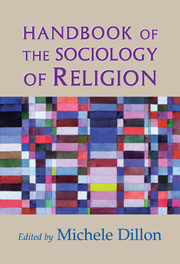Book contents
- Frontmatter
- Contents
- List of Contributors
- Acknowledgment
- Part One Religion as a Field of Sociological Knowledge
- 1 The Sociology of Religion in Late Modernity
- 2 Studying Religion, Making it Sociological
- 3 The Ritual Roots of Society and Culture
- 4 Social Forms of Religion and Religions in Contemporary Global Society
- 5 The Evolution of the Sociology of Religion
- Part Two Religion and Social Change
- Part Three Religion and the Life Course
- Part Four Religion and Social Identity
- Part Five Religion, Political Behavior, and Public Culture
- Part Six Religion and Socioeconomic Inequality
- References
- Index
1 - The Sociology of Religion in Late Modernity
Published online by Cambridge University Press: 05 June 2012
- Frontmatter
- Contents
- List of Contributors
- Acknowledgment
- Part One Religion as a Field of Sociological Knowledge
- 1 The Sociology of Religion in Late Modernity
- 2 Studying Religion, Making it Sociological
- 3 The Ritual Roots of Society and Culture
- 4 Social Forms of Religion and Religions in Contemporary Global Society
- 5 The Evolution of the Sociology of Religion
- Part Two Religion and Social Change
- Part Three Religion and the Life Course
- Part Four Religion and Social Identity
- Part Five Religion, Political Behavior, and Public Culture
- Part Six Religion and Socioeconomic Inequality
- References
- Index
Summary
If there had been any doubt about the sociological importance of religion, the terrorist events of Tuesday morning, September 11, 2001, and their aftermath renewed our awareness that religion matters in contemporary times. The terrorist actions crystallized how adherence to a religious fundamentalism can destroy lives and forever change the lives of many others. The public's response to the terrorist attacks pointed to a different side of religion: the positive cultural power of ritual to recall ties to those who have died and to reaffirm communal unity and solidarity in a time of trial. Who would have thought that at the beginning of the twenty-first century improvised public memorials mixing flowers, photographs, steel and styorofoam crosses, and candlelight vigils would illuminate downtown Manhattan, that most modern and urbane of metropolises?
Clearly, the dawning of a new century has not been accompanied by the eclipse of religion in individual lives and in public culture. Despite, and perhaps because of, disenchantment with our increasingly rationalized society, religion continues to provide meaning and to intertwine daily social, economic, and political activity. That the continuing significance of religion in late modern society was not anticipated by classical social theorists and is at odds with much of contemporary theory is due to many factors. From an intellectual perspective it largely reflects both the overemphasis on reason and the tendency to relegate religion to the realm of the nonrational that are characteristic of modern social thought.
- Type
- Chapter
- Information
- Handbook of the Sociology of Religion , pp. 3 - 15Publisher: Cambridge University PressPrint publication year: 2003
- 7
- Cited by



